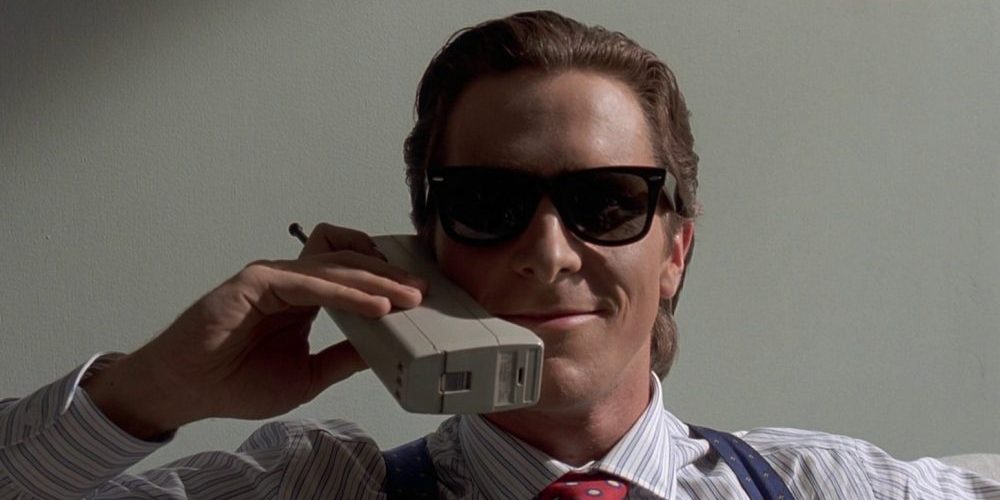In the realm of American literature, few figures have struck a chord as chilling as Patrick Bateman, the psychopathic protagonist of Bret Easton Ellis’s novel ‘American Psycho’. Bateman’s heinous crimes, committed with cold precision and a disturbing absence of guilt, captivate and horrify readers in equal measure.

Yet, the narrative leaves us with a question that goes unanswered: What if Bateman were to stand trial for his atrocities? This thought-provoking exploration of potential legal consequences provides an intriguing perspective on this iconic character, delving into the intricate labyrinth of the justice system.
It invites us to consider the weight of Bateman’s actions in a court of law, his possible penalties, and the wider societal implications, offering a compelling reason to stay on this unnerving journey.
Key Takeaways
- Patrick Bateman’s crimes in ‘American Psycho’ involve numerous murders, particularly targeting women and homeless individuals, showcasing extreme violence and sadism without remorse.
- If charged, Bateman would likely face multiple counts of murder, with the prosecution presenting evidence linking him to the crimes. The defense might argue insanity or lack of evidence, while Bateman’s wealth and connections could influence the trial.
- The societal impact of Bateman’s crimes revolves around highlighting the dark side of wealth and privilege, questioning the morality of the upper class, sparking discussions about evil and psychopathy, and challenging the perception of outward appearances versus inner thoughts.
- Patrick Bateman and ‘American Psycho’ have achieved significant cultural significance, with the character becoming iconic in popular culture, the film adaptation receiving critical acclaim and controversy, the novel exploring themes of consumerism and materialism, and Bateman representing the dark underbelly of society.
Unveiling Patrick Bateman

Delving into the psyche of Patrick Bateman, the fictional character from Bret Easton Ellis’s ‘American Psycho’, reveals a disturbing blend of psychopathy, wealth, and privilege often masked by his successful career in finance.
The psychology of Patrick Bateman is a chilling exploration into the mind of a killer, hidden beneath a veneer of upper-class respectability.
Analyzing the portrayal of violence in ‘American Psycho’, we find a brutal, unflinching depiction of Bateman’s monstrous acts, a stark contrast to his polished exterior.
Bateman’s dual nature highlights the horrifying potential of unchecked privilege and unchecked mental illness, raising questions about the morality of society’s elite.
It serves as a stark reminder that outward appearances can often conceal a darker reality hidden beneath.
Bateman’s Crime Spree

In the labyrinth of ‘American Psycho’, Patrick Bateman embarks on a horrifying crime spree, his violent acts targeting mainly women and homeless people, an engagement in extreme violence and sadism that starkly contrasts his successful career in finance.
A psychological analysis reveals Bateman as a high-functioning psychopath, his violent tendencies masked by a veneer of charm. His victims, mainly marginalized individuals, bear the brunt of his heartless brutality.
Bateman’s spree not only exposes the darker side of humanity but also reveals the disturbing ease with which such individuals can hide in plain sight.
Thus, Bateman’s crimes, while utterly abhorrent, serve as a chilling reminder of the duality of human nature and the impact of unchecked privilege on society.
Legal Implications for Bateman

While the disturbing reality of Bateman’s crimes paints a chilling portrait of societal issues, it also raises significant legal questions regarding the potential consequences he would face if brought to justice.
The media’s portrayal of Bateman as an enigmatic figure might sway public opinion, potentially influencing the trial’s outcome.
His defense team could argue diminished capacity due to his evident psychological issues, bringing the role of mental health into sharp focus.
The prosecution, on the other hand, would likely underscore Bateman’s calculated brutality, challenging any insanity defense.
This legal battle would not only determine Bateman’s fate but also ignite broader conversations about the intersection of mental health, wealth, privilege, and the justice system.
Influence of Wealth on Trial

Shielded by opulence and privilege, Patrick Bateman’s wealth could potentially play a significant role in his trial, skewing the scales of justice in his favor. His affluence could afford him access to the best legal defense strategies, which could manipulate the court proceedings to his advantage.
Bias and corruption, while not always blatant, can subtly infiltrate the justice system, potentially reducing the severity of his sentence or even leading to his acquittal. Wealth can create a veneer of respectability, diverting attention from the heinous crimes committed.
Thus, Bateman’s wealth could serve as a protective shield, allowing him the privilege of evading the full consequences of his actions, thus highlighting the influence of wealth on trial outcomes.
Potential Sentencing Outcomes

Despite the influence of wealth potentially swaying the court proceedings, should justice prevail, Patrick Bateman could face severe legal ramifications for his transgressions.
In considering potential sentencing outcomes, the following aspects come to light:
- Rehabilitation vs Retribution: Given Bateman’s psychopathic tendencies, rehabilitation might be considered less likely. Retribution, in the form of a life sentence or even the death penalty, might be the court’s decision.
- Impact on the victims’ families: Severe sentencing could provide some closure.
- Bateman’s wealth and connections: These could potentially influence the severity of the sentence.
- Legal principles: If Bateman is found guilty, the principle of proportionality should ensure a sentence reflecting the gravity of his crimes.
These factors would significantly shape Bateman’s sentencing, with immense implications for him and society.
Societal Reflections on Bateman’s Actions

In the wake of Patrick Bateman’s horrifying actions, society finds itself grappling with profound questions about the intricate interplay of wealth, privilege, and morality. The psychological effects of Bateman’s heinous acts ripple through societal consciousness, raising uneasy queries about our collective values.
Are we enabling such horror by glorifying material success, regardless of the means to achieve it? This cultural critique permeates through Bateman’s story, forcing us to confront the uncomfortable truth hidden beneath the veneer of prosperity and power.
In the end, Bateman’s tale serves as a mirror, reflecting not only the depths of individual depravity but also the systemic conditions that could cultivate such monstrosity. It’s a chilling reminder of the monsters that might lurk beneath the guise of normalcy.
The Morality Debate

The morality debate surrounding Patrick Bateman’s actions ignites a fiery discourse on the ethical implications of his behavior and the societal constructs that may enable it. The moral dilemma surrounding Patrick Bateman’s crimes: justified evil or unforgivable acts? This question forms the crux of the debate.
- Justified Evil: Some argue that Bateman’s crimes, while heinous, are a critique on the superficiality and moral bankruptcy of his society.
- Unforgivable Acts: Others contend that his brutal acts are unforgivable, irrespective of the societal commentary.
- Societal Notions: Bateman’s actions challenge societal notions of right and wrong, forcing a reevaluation of moral standards.
- The Wealth Factor: Bateman’s wealth and high societal status further complicate the debate, leading to discussions on privilege and justice.
Psychopathy and Society

Bateman’s psychopathic tendencies, showcased vividly in his brutal crimes, offer a chilling glimpse into the potential intersections of mental illness and societal influence. The shocking reality is that these tendencies are often overlooked due to Bateman’s charm and social status, highlighting a significant societal responsibility for identifying psychopathic tendencies.
This failure to recognize and address such dangerous mental health issues can have dire consequences, as depicted in Bateman’s horrific acts. His story underscores the importance of mental health awareness, urging society to take a proactive stance against untreated psychopathy.
In essence, Patrick Bateman’s narrative serves as a stark reminder of the perils of ignoring psychopathy, and the dire need for society to prioritize mental health awareness and intervention.
Bateman in Popular Culture

While the depiction of Patrick Bateman’s psychopathy and its societal implications are indeed horrifying, his character has paradoxically carved out a notable niche in popular culture.
- Cultural Impact: Bateman, the embodiment of capitalist greed and psychopathy, has influenced dialogues about moral corruption in modern society. His character has compelled audiences to question the thin veneer of civility that masks primal violence.
- Portrayal in Popular Media: Bateman’s chilling persona has been replicated in numerous films and series, cementing his status as an iconic horror character.
- Influence on Horror Genre: Bateman has redefined the horror genre with his blend of yuppie charm and cold-blooded brutality, steering it towards psychological terror.
- Depiction of Violence: Bateman’s extreme violence, while disturbing, has sparked debates about the limits of on-screen violence and its societal implications.
Themes and Symbolism in American Psycho

Diving into the labyrinth of symbolism and thematic richness in ‘American Psycho’, one uncovers a stark exploration of materialism, superficiality, and the dehumanizing effects of consumer culture.
The role of consumerism in ‘American Psycho’ is a pivotal one, driving the narrative and shaping Bateman’s actions. Bateman’s obsession with designer brands and status symbols is a biting critique of 1980s Wall Street excess.
The symbolism of violence in ‘American Psycho’ is equally significant, acting as a visceral manifestation of Bateman’s internal chaos and moral decay.
It is through this lens that the novel examines the dark side of the American Dream, using Bateman’s psychopathy as a metaphor for the soullessness and inhumanity inherent in unchecked consumerism and superficiality.
Conclusion
In examining the hypothetical legal repercussions for Patrick Bateman, a stark image of society’s complexities is painted. While the law would invariably demand severe punishment, discussions of wealth’s influence on justice and the nature of psychopathy remain.
Bateman’s character, a disturbing symbol of unchecked privilege and consumerist culture, continues to provoke thought, demonstrating the power of fiction in reflecting society’s darkest corners.
The enduring cultural significance of ‘American Psycho’ reaffirms this disturbing yet insightful portrayal.